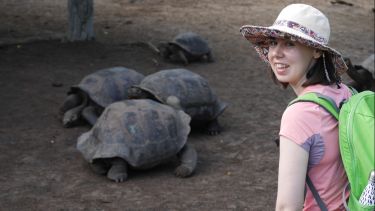I'm now ready to apply my new skills and knowledge to a career in conservation

What made you decide to study MSc Biodiversity and Conservation in 91ÖḟĠċ?
I was looking for a masters programme at university with an established record of world-leading scientific output because I wanted to be taught by academics who are passionate about their work. I was also looking for a course where I could develop a broad knowledge of biodiversity and conservation topics, because this is a relatively new field for me. One major benefit of the MSc Biodiversity and Conservation course is that I am able to cover topics I find interesting in greater depth.
What are you doing for your MSc project?
My MSc project involves comparing land-sparing and land-sharing scenarios to determine which strategy is better for biodiversity outcomes. For this project, I am predominantly working alongside Professor David Edwards. My project included two fascinating weeks of wildlife surveying in the Peak District National Park, meaning that my analysis will now include geospatial mapping and modelling techniques. I am delighted to have the opportunity to apply the field and analytical skills, which I have developed in other areas of the course, into this final piece of work.
What have you enjoyed most about the course?
I have thoroughly enjoyed the experience of learning about topics I am passionate about from academics who share these passions. I have also really enjoyed learning the coding language, R, as well as modules where I have had to analyse biodiversity in space and time. At the beginning of the course, I was terrified of coding and now I couldnât imagine working without it! I was really impressed by how coding classes were structured to accommodate all levels of ability, which enabled me to learn at my own pace. This means that I am now capable of writing code for some fairly sophisticated statistical tests, which I have utilised in my MSc project. Lastly, I have enjoyed getting to know my coursemates, who are some of the most caring, interesting and down-to-earth people Iâve ever met.
What scientific skills have you developed during your course?
I have developed a much deeper understanding of biodiversity and conservation issues, as well as the science that underlies many policy decisions. I have also greatly improved my field, analytical and statistical skills.
What transferable skills have you developed during your course?
I have developed my writing and presentation skills, which now allow me to communicate with a wide range of audiences effectively. I have also improved my ability to work as part of a team through group projects, as well as my time management and project management skills.
What do you hope to do after your degree?
The world is my oyster! The course has equipped me with a great toolkit of skills that could be applied to many different careers. I would love to work in the public sector or for a Non-Governmental Organisation, which ensures that my efforts correspond to valuable contributions to conservation on a day-to-day basis. I am now equipped with a level of knowledge that would allow me to work anywhere in the world, however, I have a real passion for conservation in the UK. I hope to be able to work somewhere where I can contribute to improving biodiversity and influence relevant governmental policies.
What would you say to a prospective student who is considering studying MSc Biodiversity and Conservation at 91ÖḟĠċ?
Although the taught components of the course cover broad subjects, they also provide students with the scope to dig deeper into topics they find really interesting. Certainly, the more effort you put into it the more you will get out, but all supervisors and module leaders have been exceptionally helpful, considerate, and supportive - all the way from the point of application, to feedback on assignments, to planning dissertation projects. If you are passionate about biodiversity and conservation and are considering continuing in academia or want to take your career to the next level, this course is for you.
This year has been an exceptionally difficult year to study with all the uncertainties of lockdowns and remote working. However, I have always felt connected with the University and never felt like I was forgotten about. I have never been at an institute where I have felt so supported, with staff who genuinely care about my wellbeing and progress. Dr Tom Webb, the Postgraduate Director, has been especially supportive and has made positive actions when students have voiced concerns.

Postgraduate online open day
Become part of our community of talented postgraduate taught students. Register now to join us at our online open day on Wednesday 30 April 2025.

